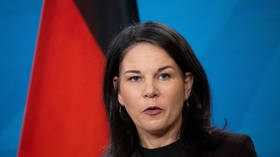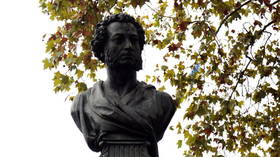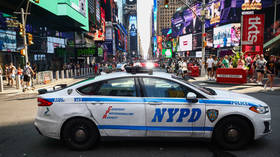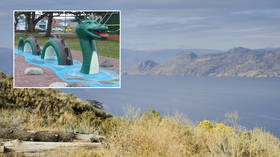From everyday language to the worlds of Shakespeare and Austin, mainstream media looks for racism everywhere
CNN has taken cancel culture to a new level, pushing to police everyday language, some of which has nothing to do with racism, and they are not the only mainstream media outlet raising alarms with critics of political correctness.
Some of the terms called into question by one of the network’s latest ‘thinkpieces’ are acknowledged as having origins rooted in racism like “sold down the river,” but others have no connection to it.
For example, “master bedrooms/bathrooms,” terms some realtors have retired in light of protests against racism across the world, are phrases that were first used in 1926, decades after slavery was abolished in the US, a fact the piece waves off.
“It’s unclear whether the term is rooted in American slavery on plantations, it evokes that history,” the CNN story reads.
Also on rt.com As Dems claim Trump defends monuments to protect Confederate traitors, list of destroyed statues unrelated to racism growsSimilarly, the Masters Tournament is pointed to as a troubling term. The name, used as the name of the annual golf tournament, originated in the ‘30s. It is merely the use of “masters” CNN takes issue with.
“The name appears to have been a reference to golfers with great skills, but its connotations have brought the name under scrutiny,” the network reports.
“Blacklist” and “whitelist,” mostly used in tech industries to describe allowed and not-allowed content, are given similar treatment. The "black list" actually originated in the 1639 drama ''The Unnatural Combat' by Philip Massinger. It is also found in the state papers of Charles II to describe a list of men who were behind the execution of his father.
Others like “peanut gallery” and “grandfather clause” have origins in describing poor or uneducated black citizens, but even if such origins are accepted as central to these terms, they have clearly taken on colloquial definitions that have erased any connection to racism from the minds of most people.
Critics were quick to point out CNN may be making a problem where there is none, capitalizing on a culture more empowered to ‘cancel’ and deem content or language racist or problematic thanks to the groupthink so prevalent on social media.
Also on rt.com 'What would Hattie McDaniel think?' HBO chief says removing 'Gone with the Wind' was 'no brainer'“I’m getting the distinct vibe that only white liberals are offended by any of these,” Post Millennial columnist and YouTuber Blaire White tweeted in reaction to the story.
“Ah yes when shown the ‘master bedroom’ my first thought is often taken back to the slave trade,” another user added.
CNN admits most of the terms on its list don’t have racist origins, but we must ban them now becausehttps://t.co/eueItiynwr
— Ashe Schow (@AsheSchow) July 6, 2020
CNN is not the only mainstream media outlet raising the alarm bells of cancel culture critics — though some liberals argue this term mischaracterizes the goals of cultural heritage being reviewed through the lenses of mordern political correctness.
A recent piece from The Washington Post highlighted the fact that while film and television have been heavily targeted by the left — see everything from the unquestionably progressive ‘Hamilton’ being targeted to the suggestion that any content depicting cops as protagonists should be ceased — books have gone largely unnoticed.
“Perspective: While offensive TV shows get pulled, problematic books are still inspiring debate and conversation,” The Post tweeted when promoting their story.
The piece itself points to classic literature that does not meet the standards of today, including depictions of black people in plays like Shakespeare’s ‘Othello', as well as the “unbearable whiteness of Jane Austin novels.”
NPR similarly called for people to "decolonize" their book shelves last month by resisting “the colonialist ideas of narrative, storytelling, and literature that have pervaded the American psyche for so long.”
Also on rt.com A post-modern euphemism for book-burning? NPR faces backlash after urging white Americans to ‘decolonize’ their bookshelvesCritics pointed to decades-old literature that depicted a much different society being judged by today’s politically correct measuring stick as being proof of a slippery slope that has gone from targeting Confederate statues to pieces of actual art that have been, until now, largely accepted as educational tools.
“They’re not going to stop,” Spectator USA Stephen Miller tweeted, almost immediately being accused by the writer of the story from The Post for not reading the piece, which never explicitly calls for mass cancellation of books.
“Buy physical copies of your favorite books. Things are getting creepier with each passing year,” Washington Times writer Douglas Ernst tweeted in reaction.
Some saw the piece as a blatant call to “burn” literature that does not meet today’s ‘standards.’
"Banning and burning problematic books has a problematic history,” conservative filmmaker Dinesh D’Souza wrote.
“Problematic books.” 🧐 https://t.co/Vylvv7HHeS
— Raheem Kassam (@RaheemKassam) July 6, 2020
A political party once upon a time didn't like ''problematic books'' yeah their leader had a funny mustache.
— Diego Velazquez (@DiegoVZ1599) July 6, 2020
In the wake of protests kicked off by the May 25 death of George Floyd, many pieces of pop culture have been outright banned or targeted by social media campaigns to be censored in one way or another.
‘Live PD’ and ‘Cops,’ two long-running reality television shows following police officers on arrests, were given the axe by their respective networks, and ‘Gone with the Wind,’ which includes the first ever performance by a black actor to win an Oscar, was briefly scrubbed from streaming service HBO Max until it was given a disclaimer explaining that its content — the film takes place during the Civil War —may be offensive.
Other streaming services have taken down episodes of shows that include questionable examples of blackface, some of which were themselves satires on the racist nature of the act itself.
First of all, they were in mud masks not blackface. And second of all, in what world does "Stop killing us." sound like "Please remove episodes of Golden Girls"? I didn't see that ask on anyone's protest sign... https://t.co/cgEcGdD60o
— erica williams simon (@missewill) June 28, 2020
Hi @NetflixUK, just wanted to let you know that the Its Always Sunny episodes you removed are very clearly anti-racist and the fact you removed them takes away from the light they shed on how stupid it is for people to still be doing the things they do
— Jacob Fulls (Yabo) (@JacobFulls) June 14, 2020
Like this story? Share it with a friend!














